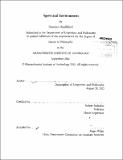| dc.contributor.advisor | Robert Stalnaker. | en_US |
| dc.contributor.author | Rochford, Damien (Damien Joseph) | en_US |
| dc.contributor.other | Massachusetts Institute of Technology. Department of Linguistics and Philosophy. | en_US |
| dc.date.accessioned | 2014-01-23T18:43:05Z | |
| dc.date.available | 2014-01-23T18:43:05Z | |
| dc.date.issued | 2013 | en_US |
| dc.identifier.uri | http://hdl.handle.net/1721.1/84421 | |
| dc.description | Thesis (Ph. D.)--Massachusetts Institute of Technology, Dept. of Linguistics and Philosophy, 2013. | en_US |
| dc.description | Cataloged from PDF version of thesis. | en_US |
| dc.description | Includes bibliographical references (pages 65-67). | en_US |
| dc.description.abstract | This paper is about how agents learn. There is a picture of learning that is very influential in epistemology; I call it 'the Classical Picture'. As influential as it is, it is a flawed picture of learning, and epistemology is distorted by it. In this paper, I offer an alternative: the Calibration Picture. It is based on an extended analogy between agents and measuring devices. Epistemology looks very different from the Calibration point of view. Distinctions that are absolute, given the Classical Picture, are relative, given the Calibration Picture. These include the distinction between enabling and justifying roles of experience, the distinction between a priori and a posteriori knowledge, and the distinction between irrationality and ignorance. The beautiful thing about the Calibration Picture is that it gives you a precise way to characterise what is absolute, and a precise way to recover Classical distinctions from that absolute thing, relative to a context. In this way, the Calibration Picture enables you to recover much of the power of the Classical Picture, while offering a new way to understand its significance. | en_US |
| dc.description.statementofresponsibility | by Damien Rochford. | en_US |
| dc.format.extent | 67 pages | en_US |
| dc.language.iso | eng | en_US |
| dc.publisher | Massachusetts Institute of Technology | en_US |
| dc.rights | M.I.T. theses are protected by
copyright. They may be viewed from this source for any purpose, but
reproduction or distribution in any format is prohibited without written
permission. See provided URL for inquiries about permission. | en_US |
| dc.rights.uri | http://dspace.mit.edu/handle/1721.1/7582 | en_US |
| dc.subject | Linguistics and Philosophy. | en_US |
| dc.title | Agent and environment | en_US |
| dc.type | Thesis | en_US |
| dc.description.degree | Ph.D. | en_US |
| dc.contributor.department | Massachusetts Institute of Technology. Department of Linguistics and Philosophy | |
| dc.identifier.oclc | 868026403 | en_US |
